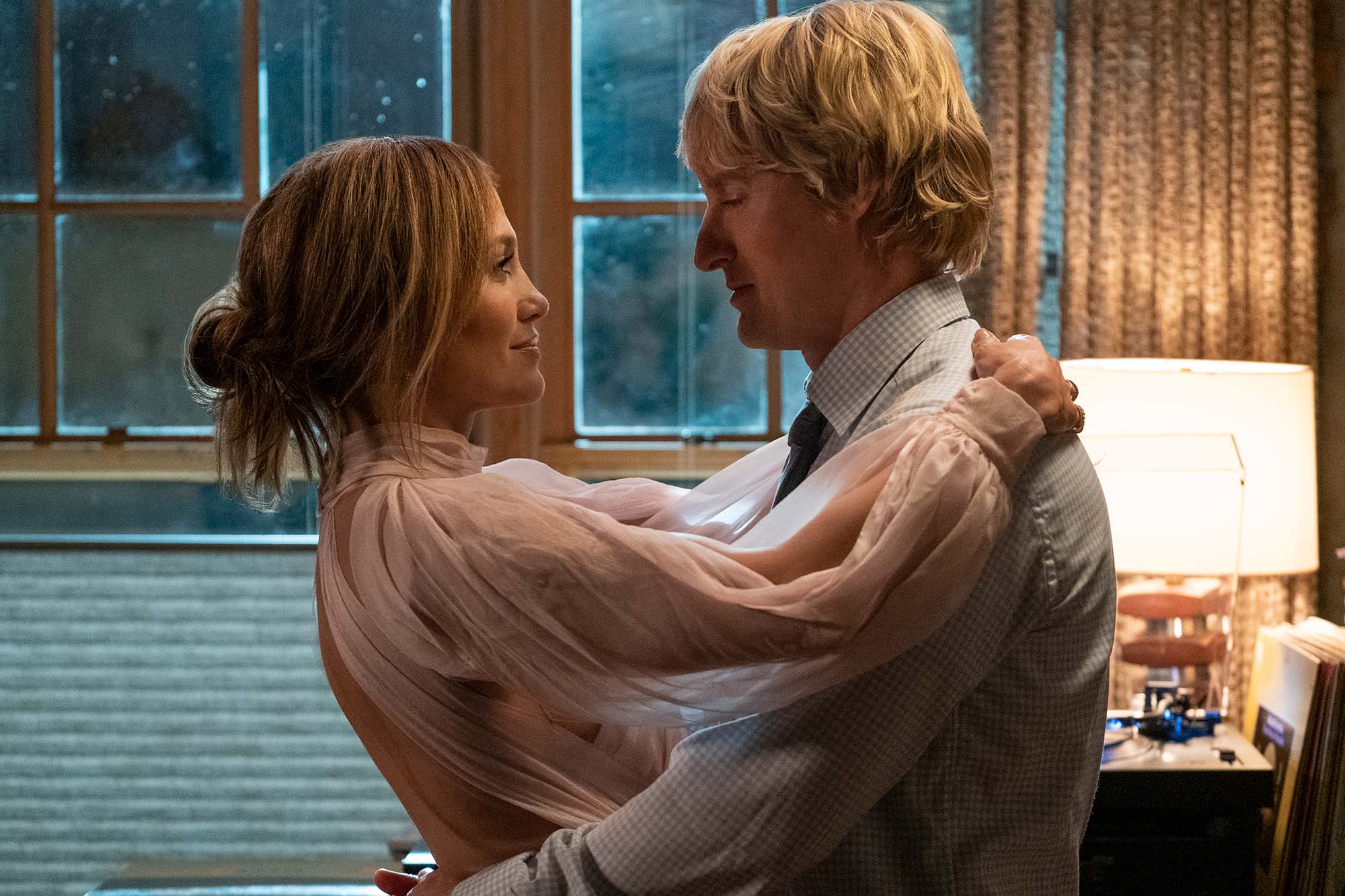In a world starved for glamour, thank goodness for Jennifer Lopez. There’s a moment in her new romantic comedy, Marry Me, where, as a worldwide pop star who impetuously marries a regular-guy math teacher (Owen Wilson), she makes a showbiz entrance almost too outsize for even the big screen. Rising from the depths of an arena stage in a cloud of sea-foam white smoke, her pulled-back hair capped with a spiny jeweled crown, she’s the spirit of midcentury movie and swimming star Esther Williams incarnate. Her skin is luminescent, like the inside of a shell. Her bearing is both regal and athletic, a reminder that she’s not really a deity, but a middle-aged woman who works hard to keep every muscle sculpted. Real yet unreal, she’s the kind of extravagant vision that the movies, so obsessed with green-screen special effects, barely have room for anymore.
Lopez, one of the most gifted and appealing performers of the past two decades, is a huge star—and yet the movies have rarely known what to do with her and her significant gifts as an actor. Her breakthrough performance in Steven Soderbergh’s 1998 Out of Sight was a knockout. Yet somehow Lopez became the kind of actor that the moviegoing public seemed to write off as being “good enough” for romantic comedies but not much else—as if, somehow, romantic comedies required lesser gifts, when in truth the bar is quite high. Lopez has been the best thing about other-wise flawed comedies, like Maid in Manhattan (2002) or Monster-in-Law (2005). At the same time, alleged failures like the not-really-that-bad Gigli (2003) have been held against her. In 2019, at least, she got some vindication. Her dazzling turn in Hustlers—as the Lucite-cool veteran stripper queen Ramona—once again reminded moviegoers how much Lopez has to offer as a dramatic actor, even if the Academy didn’t deign to notice.
No one needs to feel sorry for Lopez, a star with a loyal fan base who has made piles of dough both as an actor and as a musical performer. But it’s still possible for a celebrity to be both hugely successful and underappreciated, and Lopez falls into that category. Marry Me is a lively, casual delight, its premise delectably preposterous: Lopez plays Kat Valdez, a superstar who’s completely comfortable living her life in the public eye and thus has no qualms about marrying her fellow–superstar fiancé Bastian (played by Colombian pop star Maluma), in a global broadcast. Just as she’s about to step out for her big “I do”—in a massive jeweled dress that billows around her with reckless disregard for the laws of space, time, or physics—she’s heartbroken to learn, via social media, that Bastian has cheated on her. But she’s got the dress, the venue, the guests—why not just go through with it, whatever it may be? And so, as her lawful wedded husband, she chooses from the audience a random “guy in a windbreaker,” as one incredulous bystander describes him. Windbreaker guy is Wilson’s Charlie, and though the marriage begins as a stunt, these two creatures from different worlds start to genuinely fall for each other.

If that premise sounds roll-your-eyes crazy, it’s only by modern standards: audiences of the 1930s and ’40s were completely comfortable with screwball marital comedies—The Moon’s Our Home, The Miracle of Morgan’s Creek—in which people make nutso seat-of-the-pants decisions when choosing life partners. And Wilson and Lopez are charming together, not only because they’re both charismatic, likable actors, but also because the two of them, both in their early 50s, come off as people who’ve done some living. It’s easy to buy Wilson, with his boxer’s nose and almost visibly bruised heart, as a divorced, single—dad math whiz who’s too distracted to consider he might have a second chance at love. And while Lopez may look ageless, Kat’s been around—she trails a list of ex-husbands even longer than the train on that wedding dress. Yet she still believes her guy is out there, and Lopez, with her joyous, tremulous optimism, makes you believe it too.
Because Lopez is always believable. Even if, in real life, she’s a survivor in a tough business, her features haven’t become calcified by cynicism. Her Bronx backstory is part of her muscle memory; she’s rags and riches in one person. There’s softness in her gaze, a kind of dreaminess that speaks of, and to, human vulnerability.
Yet she’s also commanding enough to hold a screen of any size, and certainly the big one. Romantic comedy as a genre is in a rut. It’s easy to spend an evening slumped in front of entertaining yet not wholly satisfying episodes of And Just Like That … or Emily in Paris. We may not think of these series as “good” television, and really, we may just want to turn our brains off for an hour or two. But when did everything, including our expectations, get shrunk so small? We can ask more of romantic comedies, and there’s no shame in yearning for spectacle and glamour, too: J. Lo rising from a foamy faux ocean like a showbiz deep-sea goddess, anyone? Never mind the train of a fairy-tale dress; sometimes not even the big screen is large enough for our dreams.
Sign up for More to the Story, TIME’s weekly entertainment newsletter, to get the context you need for the pop culture you love.
More Must-Reads from TIME
- Caitlin Clark Is TIME's 2024 Athlete of the Year
- Where Trump 2.0 Will Differ From 1.0
- Is Intermittent Fasting Good or Bad for You?
- The 100 Must-Read Books of 2024
- Column: If Optimism Feels Ridiculous Now, Try Hope
- The Future of Climate Action Is Trade Policy
- FX’s Say Nothing Is the Must-Watch Political Thriller of 2024
- Merle Bombardieri Is Helping People Make the Baby Decision
Contact us at letters@time.com